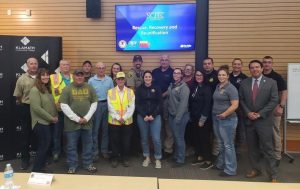A Multi-Disciplinary, Multi-Agency Success in Learning and Collaboration: Klamath Falls, Oregon, CART Training
NCJTC Associate Tony Rodarte reflects on the power of Child Abduction Response Teams, and his love of teaching in the CART Program.
The back story: “I thought, Holy cow – We need more hands on deck immediately.”
Tony Rodarte is no stranger to high profile cases. He retired from the Maricopa County, Arizona Sheriff’s Department in 2018 after 20 years – his last 11 in Homicide. But what always stuck out to him during his career were his early days in the department when he was faced with working child abduction cases.
“Early on we felt like we were on an island. A child abduction response is a high anxiety, low frequency event – but when they happen there is a lot of stress,” Rodarte said. “We weren‘t training on these cases regularly. We didn’t have the newest information, and we weren’t coordinated. I thought holy cow – we need more hands on deck immediately. So, ultimately we created a team in conjunction with the state.”
The key word – a team. Rodarte became an active and instrumental member of Arizona’s statewide Child Abduction Response Team (CART) from its inception in 2011. Maricopa County Sheriff’s Department served as a host agency with the AZCART, and Tony as co-coordinator of the statewide team in 2016. And, after his retirement, he knew what he wanted he to do: share his knowledge, experiences, and lessons learned with others.
“I firmly believe we are better together,” he said. A single child abduction response can cripple a small agency quickly. And, if we can equip and prepare them with the necessary training and resources, then we are a step ahead.”
From CART in Action to CART in the classroom: Spotlight on Klamath Falls, Oregon. “During the investigation is not the time to learn.”

Klamath Falls, Oregon, is a city of about 20,000 people well known as the gateway to Crater Lake National Park.
It was also the site of a recent CART training by the AMBER Alert Training and Technical Assistance Program, during which Tony Rodarte provided instruction along with fellow NCJTC Associates who are subject matter experts in law enforcement response to engendered missing and abducted children.
“It was a great group in Oregon, and what made it great was the diversity,“ Rodarte said. “There were sworn officers and civilians, and a mix of people who were all engaged and vigorously taking notes.”
The 50 people who attended ran the gamut from local and state law enforcement, to search and rescue personnel and corrections officials. The course focuses in on critically important investigative elements of response, including activation and deployment of CART in a case, establishing incident command and field considerations for mobile command operations, search and canvassing, volunteer management, and various other physical and personnel resources to improve the overall response to endangered missing and abducted child incidents.
“At night, in the midst of an active child abduction, is not the time to learn. Now is the time to learn,” Rodarte emphasized as he worked with participants of the Klamath Fall CART class. And learn they did. Julie Harper with the Klamath County Community Corrections Department had great things to say about the legal issues module. “He is an excellent speaker and kept my attention throughout his presentation. I like that he brought some humor into the discussion since it is such a serious topic.”
The impact of CART training, and what’s next. “I hope they never have to use the information – but if they do, they will be ready.”
A key objective of AATTAP’s CART training is to encourage collaboration amongst agencies and resource providers within jurisdictions, so that when missing children cases happen, there is a team approach.
“Everything that was taught will help me improve our response to missing children,” said Ryan Kaber of the Klamath County Sheriff’s Office.
Another key component of the training involves tabletop exercises that give participants from different agencies – and who have different roles within their law enforcement and public safety work – to think through elements of response and decision-making together.
“I enjoyed being able to work with others from different agencies to come up with answers and see what we did right and wrong, offered Craig Delarm of the Lake County Search and Rescue Department.
The participants walked away with real, actionable items to begin making a difference in their communities. This was reflected in the comments of Kami Wilton, Klamath County Community Corrections Division, who said, “We hope to partner with the Klamath County Sheriff’s Office to create a team.”
As for Tony Rodarte, he was energized and encouraged with the training. And this is a feeling he takes with him from nearly every CART training of which he’s a part.
“I hope they walk away with first steps; and in a perfect world, we all hope to never need a CART response. However, the world we live in means these investigations are going to take place. And so, we must be ready. We work to provide information and resources to help participants retain the fundamentals, and build on that readiness as they return to their agencies.”
Sheriff Chris Kaber of the Klamath County Sheriff’s Office spoke directly to just the sort of readiness Rodarte hopes to impart. “The information we obtained in this valuable training has better prepared us for responding in the initial hours of a missing child investigation. We have already used some of the techniques we learned at this training in other high profile investigations; the benefit was almost immediate.”
Learn more about the CART program, and find an array of CART resources, at amberadvocate.org/cartresources.
Written by Jon Leiberman, NCJTC-AATTAP Associate Journalist
